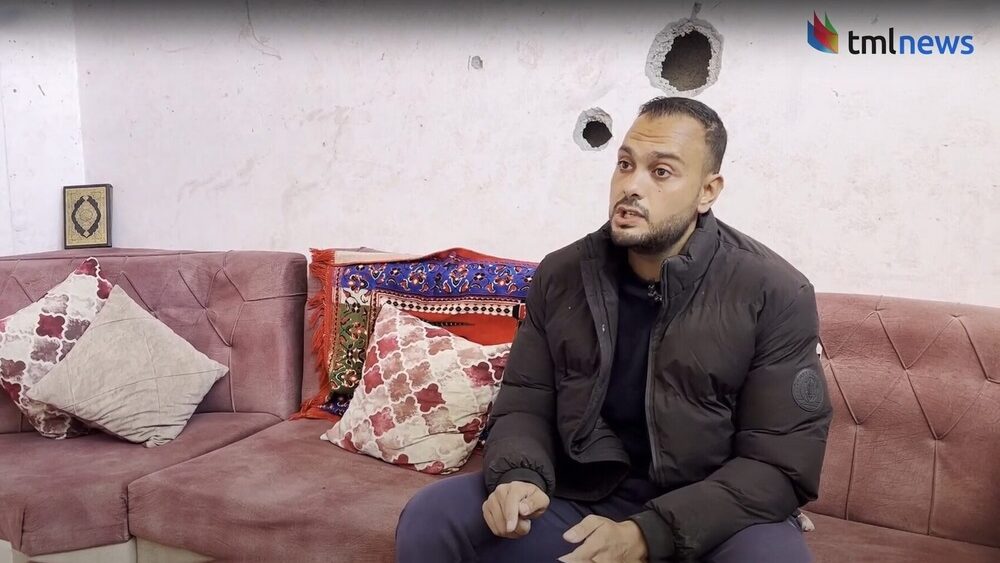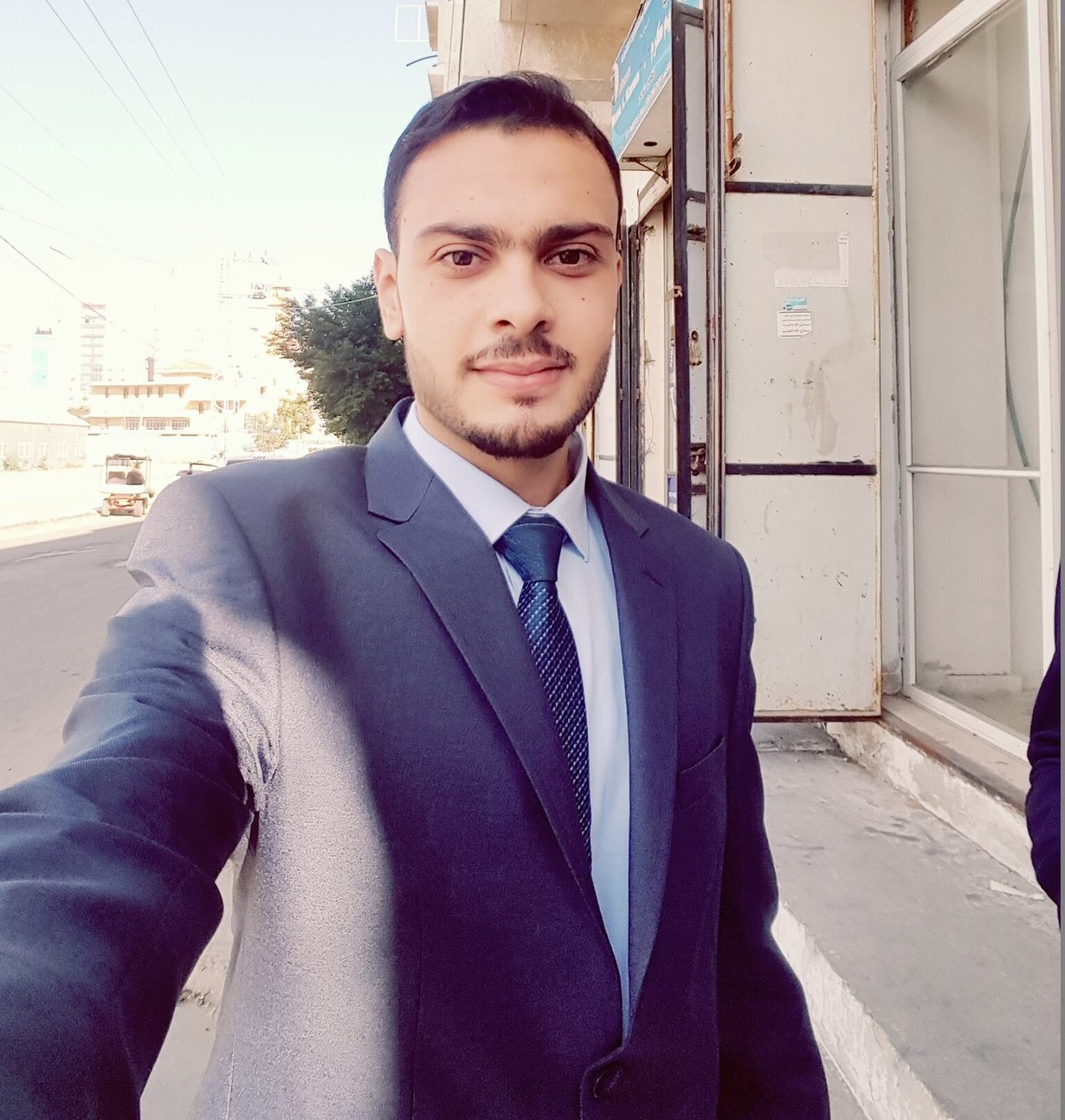‘Save Us’: Leader of Gaza’s Anti-Hamas Movement Seeks Dialogue With Trump
In an exclusive interview with The Media Line, the leader of Gaza’s anti-Hamas protest movement highlights the risks of opposing the Hamas regime and urges the international community to acknowledge Gazan civilians as victims
Since returning to office earlier this year, President Donald Trump has made a series of contentious statements about Gaza—suggesting that the US take control of the territory, proposing to relocate civilians to transform it into the “Riviera of the Middle East,” and warning that Gaza’s residents will be “DEAD!” if they continue to hold hostages. Moumen al-Natour, a leader of Gaza’s anti-Hamas protest movement, has a direct request for President Trump: Speak with civil society leaders in Gaza who are oppressed by Hamas and envision a different future for the war-torn enclave.
“Let’s talk,” al-Natour said he would tell the US president if they could meet. “Gazans are not Hamas.”
Speaking to The Media Line in an exclusive interview, al-Natour, 29, didn’t mince words. “Hamas does not represent all the Palestinians, and the Palestinians in Gaza hate Hamas and want peace with Israel,” al-Natour said.
Al-Natour, a lawyer and prominent leader of the We Want to Live movement, is a former political prisoner who was jailed by Hamas. Since 2019, he has been arrested more than 20 times and investigated on suspicion of spying for Israel, the Palestinian Authority, Egypt, the United Arab Emirates, and other Arab countries.
I want to convey the true image of Gaza and its people: Gaza is not Hamas. The people of Gaza hate Hamas.
“I want to speak to everyone who criticizes Hamas—journalists, politicians, activists, and others,” he said. “I want to convey the true image of Gaza and its people: Gaza is not Hamas. The people of Gaza hate Hamas.”
“The people in Gaza feel that we are hostages to Hamas, but no one talks about us,” he said, adding that Palestinian civilians should be given the right to manage the “safe zone” established by Israel in Gaza.
Born in Gaza, al-Natour studied law at the University of Palestine and later lived in Egypt. He began leading anti-Hamas protests in March 2019, founding the We Want to Live movement, which called on Gazan residents to take to the streets and urged civil disobedience to protest Hamas policies, exorbitant taxation, and the regime’s failure to provide jobs for young people.
Even before the October 7, 2023, Hamas attacks and the devastating war that followed, conditions in Gaza were dire. Al-Natour described unemployment over 80% and poverty exceeding 60%. “Even government employees—whether for Hamas or the Palestinian Authority—were getting low salaries,” he said. “Salaries were barely enough for rent or to buy necessities like medicine.”
He said many Palestinians were trying to flee Gaza for Europe in search of a better life.
It was this economic crisis, which al-Natour blames on Hamas’ mismanagement, that sparked the protest movement. “We needed a revolution for our society,” he said. “Society is the foundation of any regime, any government, any state. If society collapses, then the whole state will collapse.”
Thousands of Gazans joined the 2019 protests. Hamas responded with force. Over 1,000 demonstrators were arrested, and many were assaulted by security forces. “Of course, being against the leadership of Hamas, against a radical regime, is very dangerous,” al-Natour said. “But the situation in Gaza forces us to do these things.”
He was arrested by Hamas for what the armed group claimed were “security suspicions.” He was also arrested for leading an online campaign under the title “We Don’t Want War,” and was accused of “slandering the highest-ranking leaders in the country.”
Since March, al-Natour has again taken to the streets, demanding Hamas step down and end the war. “Hamas does not represent the majority of the Palestinian people in Gaza,” he said. “The numbers of protesters are increasing every day. Everyone declares … that they do not want Hamas to remain in Gaza.”
The suffering has made people desperate. “The community here is desperate and trying to get out of the impasse that Hamas has put it in,” he said. “Our education has been suspended for two years. The health system is over. The infrastructure sector is over. The country is not good for living. The country is not good for life.”
The Palestinian people in Gaza want to live. They want to live a dignified life. We want to leave the tent and go home.
He estimated that no more than 200,000 out of Gaza’s 2 million residents support Hamas. “The Palestinian people in Gaza want to live. They want to live a dignified life. We want to leave the tent and go home.”
Give the gift of hope
We practice what we preach:
accurate, fearless journalism. But we can't do it alone.
- On the ground in Gaza, Syria, Israel, Egypt, Pakistan, and more
- Our program trained more than 100 journalists
- Calling out fake news and reporting real facts
- On the ground in Gaza, Syria, Israel, Egypt, Pakistan, and more
- Our program trained more than 100 journalists
- Calling out fake news and reporting real facts
Join us.
Support The Media Line. Save democracy.
Just as in 2019, Hamas has responded to protests with violence. One protester, 22-year-old Oday Al Rabay, was reportedly tortured and killed. Al-Natour said this repression has made many civilians keep a low profile. “There is no safety in Gaza,” he said. “Danger is everywhere. I just try not to be accessible all the time.”
Women are absent from protests, which al-Natour attributed to their overwhelming domestic burdens. “Today, after October 7, women don’t have a kitchen. They don’t have gas to light a fire and cook food,” he said. “How could you find them in demonstrations?”
Al-Natour’s organization, a nonpolitical group funded by foreign donors, provides aid to families that previously relied on government support. “The numbers are limited, to be honest, so that we don’t face security problems,” he said. “We don’t want to reach the point of sharing aid.”
Since the latest blockade on humanitarian aid, his group has suspended activity. “We can’t provide food or basic necessities at the current prices,” he said. “The price of tea, for example, is 20 times what it used to be.”
A 25-kilogram bag of flour now costs $300, he added. “It’s not enough for a week for 10 people.”
Al-Natour called the October 7 attacks immoral and unjustified. He supports releasing the hostages still held by Hamas and acknowledged Israel’s right to respond. “They [Palestinians] don’t want retaliation in Gaza, so help free them,” he said, arguing that if civilians had control, they would return hostages “immediately and for free.”
“We’re against the killing made by Israelis, of our women and our children,” he said. “How can we be satisfied doing the same?”
While he rejected the framing of the conflict as a religious war, he noted that Islam condemns the killing of civilians.
In addition to being immoral, the attacks of October 7 also didn’t achieve the goal of liberating Palestine, al-Natour added.
“It’s difficult for someone who did this to admit their mistake. They led people to a war that’s not worth it,” he said. “The weapons in the hands of Hamas before October 7 were weak weapons. After 18 months of the war, what did these weapons bring us? They’re not strong enough to liberate the land, to kill an entire army, or to wipe out a state.”
He noted that Israel’s Iron Dome protects against nearly all weapons fired from Gaza. “We harm ourselves, nothing more,” by firing missiles, he said, adding that Hamas has no weapon strong enough even to bring Gazans back to the evacuated city of Rafah.
From the start, he knew the war would bring mass death. “One month of the war was enough to say that we’ll lose 100,000 victims,” he said. “Today, it’s 50,000 or 51,000. Under the rubble, it could be 10,000 or 20,000. We don’t know.”
Al-Natour’s personal experience with Hamas’ repression has shaped his activism. Over the years, he has spoken out repeatedly about the group’s brutality and the absence of legal protections for its detainees.
“Hamas does not believe in the law, and its lawyers do not represent detainees in court,” he said. “I led campaigns of support for the detainees—journalists and activists—using social media and other platforms to advocate for their release. I knew they were being tortured because I went through many trials myself when I was arrested by Hamas. But I can’t stop the torture. All I can do is speak out about the detainees to help get them out of Hamas’ terrorist basements.”
Asked if US officials had contacted him, al-Natour said, “Unfortunately, no, and I hope that there will be contact between us as soon as possible.”
Once the war ends, he envisions Gaza governed by a local leader focused on justice, not politics. “Until now, we have seen initiatives … but no one discussed with the people of Gaza,” he said.
He criticized the global media spectacle of Gaza. “They see good scenes,” he said, referring to television audiences.
Despite the intense fighting between Israel and the Palestinians, al-Natour expressed hope in the possibility of a peaceful two-state solution in which Palestinians pursue a neighborly relationship with Israel.
“Why not? We call it, in Arabic, love after torture,” he said, adding that holding a grudge against Israel would only condemn future generations of Palestinians to suffering.
“We can, after this war, start a period of peace between the Palestinian people and the Israeli people. And this is important,” he said.
Al-Natour said that he recognizes the existence of Israel and called on Israel to recognize the existence of the Palestinian people as an entity distinct from Hamas.
Your problem with Hamas must be separated from civilians. Separate me.
“Palestinian people in Gaza want to get out of this war and have proven that. So, Israelis must take this into consideration and deal with the civilians based on that,” he said. “Your problem with Hamas must be separated from civilians. Separate me.”
If Hamas wants to continue a war with Israel, it can do so, but the people of Gaza ought not suffer as a result, al-Natour said.
“Israel blocks aid, goods, or similar things to cut me off and put pressure on Hamas. You put pressure, right? But today, as a civilian, what will I gain? You cut off Hamas. Hamas can collapse. Its situation can become tense. But I will collapse immediately, too, and I am a civilian. I have nothing to do with Hamas,” he said.
Al-Natour described an element of Gazan society that believes in peace with Israel and prefers US involvement in the region over Iranian involvement. “We want the role of the US in the region, and we don’t want a vacuum that brings the role of Iran to the Middle East again,” he said. “The axis of resistance is almost over. Now, we need development and prosperity. And development and prosperity need a strong state like the US.”
“We hope that the decision-makers in the United States, in Europe, and even in Israel will take bold decisions toward the Palestinian people in Gaza, the civilians,” he said.
He called on the international community to recognize the existence of a Palestinian anti-war movement, despite the deceptive images presented by Hamas-run media.
“Save us,” al-Natour pleaded. “Come and talk to us. Talk to us, whether Americans, Israelis, or others. Talk to us. Know the demands of the civilians. Separate them [Hamas] from us.”
Giorgia Valente and Dario Sanchez contributed to this report







